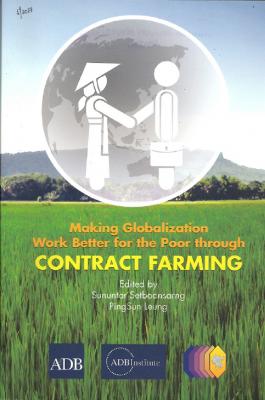
The agriculture sector plays a huge part in inclusive growth and poverty alleviation among nations. According to the Asian Development Bank (ADB), the sector is composed of about 75% of rural populations in developing countries. Among the promising strategy towards agricultural development and globalization is contract farming.
The United Nations’ Food and Agriculture Organization defines contract farming as a mechanism that organizes the commercial agricultural production of both large- and small-scale farmers. It is a means of linking farmers and buyers directly. Contract farming is one of the effective development tools that engage the private sector in rural development as they provide smallholder farmers with technology and market information (Nugent, 2014).
In this line, ADB came up with a book on “Making Globalization Work Better for the Poor through Contract Farming” last 2014. It primarily aims to provide substantial information on how contract farming can be maximized by rural community to achieve inclusive growth. The publication comprises of previously published working papers of the ADB Institute.
The compilation has four parts: Overview of Contract Farming and Regional Cooperation; Contract Farming Experience in Selected Asian Countries; Traceability Systems and Global Agribusiness Trade Regime; and Evolving Forms of Contract Farming Practices.
Specifically, the first part of the book gives a theoretical background, the roles of public and private sector, regional cooperation, and contract farming in the long term. Part II discusses the methodology used in the case studies in assessing socioeconomic impacts, it features three case studies as well on selected Asian countries’ experiences on contract farming. While the third part of the book is on the need for compliance to certification and/or traceability standards in production systems and perspectives on contract farming of some agribusiness firms in Japan and roles of the public sector in furthering the practice as a development strategy. Lastly, Part IV is about innovations on contract farming.
This provides lessons on contract farming learned by the various Asian countries. It likewise synthesizes the conditions of successful and effective contract farming arrangements in the region. These gives agricultural rural communities better chances to produce beyond subsistence levels, sustainably, to change their lives and enhance their dynamic bases.
This book is valuable to farming enthusiasts and practitioners both in the public and private sector, as well as civil society in having a better understanding on contract farming. For more details about the contents of the publication, visit the Agriculture and Fisheries Knowledge Center of the Agricultural Training Institute in Diliman, Quezon City.
